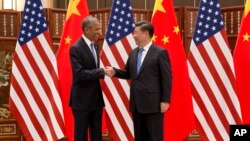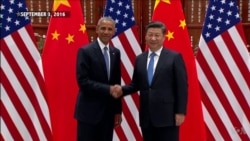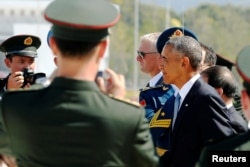The United States and China have both formalized their ratification of the Paris Agreement, a key step by the world’s two biggest polluters that aims to help bring the climate change accord into force this year.
U.S. President Barack Obama and Chinese President Xi Jinping announced the deal during a meeting in Hangzhou, which is hosting this year's G-20 summit.
“This is not a fight that any one country no matter how powerful can take alone," Obama said. "Someday we may see this as the moment that we finally decided to save our planet."
WATCH: US President Obama, Chinese President Xi meet
Xi said he hoped the announcement would benefit everyone. "Our response to climate change bears on the future of our people and the well-being of mankind," he said.
China’s state media announced early Saturday that its National People’s Congress had approved the decision at the closing of a week-long meeting. A report by the state-run Xinhua news agency highlighted China’s commitment to confront global warming and play a bigger role in global climate change governance.
Brian Deese, senior advisor to President Obama, said the announcement by Beijing and Washington sets a very clear path to help the Paris Agreement come into effect this year.
“The signal of two largest emitters and two largest economies taking this step together and taking it early – far earlier than many had anticipated a year ago - should give confidence to the global community and to other countries that are working on their climate change plans that they too can move quickly,” Deese said.
In December of last year, negotiators from 179 countries and the European Union hashed out the final details of the Paris Agreement, but so far only 23 have ratified the accord. To go into effect, at least 55 countries, or those accounting for 55 percent of greenhouse gas emissions, need to ratify the agreement.
The ratification by two of the world’s biggest emitters is a big step in the right direction as China accounts for 25 percent of the world’s emissions and the United States 15 percent.
The Paris Agreement sets aspirational post-2020 goals for countries that aim to cap global warming below two degrees Celsius and calls on signatories to set goals for peaking their carbon emissions. Once the deal has been ratified, countries have to wait a minimum of three years to exit.
Deese said that in addition to submitting their ratified agreements to U.N. Secretary-General Ban Ki-moon Saturday, Beijing and Washington also plan to release a document that outlines how the two countries will continue to make efforts to implement the deal beyond Paris.
China is expected to announce for the first time a mid-century long-term strategy for low carbon emissions.








